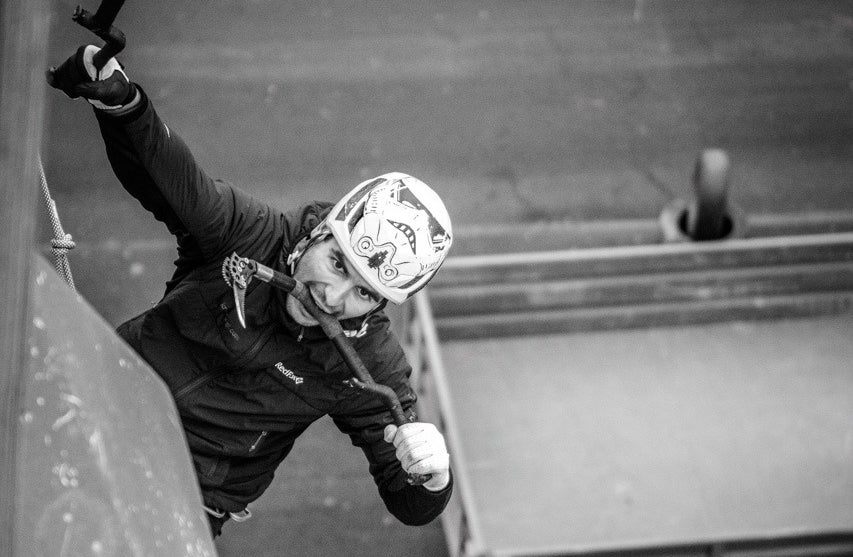Russian Ice, Boulder And Speed World Cups Cancelled: Can't Turn Blind Eye To Invasion Of Ukraine

Russian Ice Climbing World Cup medalist Alexey Marshalov. Russian ice climbers have dominated the sport, but Russia's invasion of Ukraine has caused the UIAA to halt all world-cup competitions in protest. (Photo: Evgenia Leonteva)
Just weeks from the start of competition ice climbing’s long-awaited World Cup tour—the first to be held since the 2019/2020 season—the sport’s international governing body, the UIAA, pulled the plug on the only two remaining events, both in Russia, while the IFSC has suspended the Boulder and Speed World Cup that was to be held in early April also in Russia.
It’s hard to overstate the role the Russia has played in the growth of mixed and competition ice climbing in the US. Nearly all modern ice climbing competitions feature Russian holds. Many members of the US team, myself included, compete on ice tools custom made in Russia by a craftsman we all know personally. Members of the Russian National Team have also gone out of their way to help train and advise a number of US Team members as they’ve entered the international competition scene. We’d been looking forward to the Russian events—to reuniting with old friends and competing in a place that is, in many ways, the birthplace of modern competition ice climbing.
Then, on February 24, Russia invaded Ukraine, embroiling eastern Europe in the biggest war the continent has seen in decades. The UIAA responded swiftly, canceling its Russian events the next day.
The cancellation comes at the end of a difficult and disappointing season for competition ice climbers the world over. The original 2019/2020 World Cup schedule featured four events, but the first two—to be held in Vail, Colorado, and Cheongsong, South Korea, respectively—were ultimately canceled due to coronavirus concerns. Covid also threatened the European Cup in Slovakia, which organizers pulled off just days after the country plunged into lockdown.
Now, the outbreak of war has forced the UIAA to abandon its final two events, which were to be held in the cities of Kirov in western Russia and Tyumen in Siberia.
Ukraine has fielded only a few international ice climbing competitors over the years, and these two Russian cities are far from the Ukraine border. But the cancellations weren’t just intended to keep athletes safe. They were also part of a bigger statement, says Rob Adie, the UIAA’s sports events coordinator and project manager.
Over the past few days, international sports governing bodies have been canceling huge events left and right—everything from the Russian Grand Prix to the IFSC’s Boulder and Speed World Cup in Moscow. The UIAA, Adie says, is proud to be making a stand alongside so many others.
“I fully agree that sports should be able to carry on and provide a sort of respite [amid other global hardships], but when the aggressor is also the host . . . you can’t stand there in good conscience and turn a blind eye to what’s happening across the border in Ukraine,” explains Adie.
The decision, he adds, wasn’t without complexity: Like most of the international athletes in this small and tight-knit sport, Adie has also formed friendships with many Russian climbers and event organizers. He said he’s seen many athletes reach out to both Ukrainian and Russian competitors over the past few days to offer empathy and support. And yet, he says, “I’m glad the UIAA’s board stood up and made the right decision.”
The US Ice Climbing Team had already pulled out of the Russia events due to safety and logistics concerns, but the events of the last few days have still felt shocking, says team manager and longtime US competitor Thomas Gehrlein.
Aside from feeling sorrow and outrage on behalf of the Ukrainian people, he says, “I also care about the safety of my fellow competitors and the friends I have made in Russia. Those I have been in contact with feel sad, angry, guilty, and ashamed of the actions that the Russian government has taken.”
Competitors in Russia and beyond have voiced that anguish, both about the war and about the sudden termination of the 2021/2022 World Cup Season.
“This is a blow to the heart,” wrote 2019/2020 World Cup champion Maria Tolokonina of Russia on Instagram, in response to the cancellation. “I did not think that sports and peaceful people would be drawn into this.”
And yet, according to Gehrlein, while all our hearts go out to our Russian friends, international war is an arena sports cannot afford to ignore.
“Moving forward with the events as planned would show tacit support of the Russian government’s actions,” he explains. “Our sport is small, and we may not have a large voice, but our voice should unequivocally denounce these actions.”
The International Olympic Committee (IOC) seems to agree. On February 25, the day after the Russian invasion, it released a statement both condemning the invasion and urging all athletic federations to cancel events in Russia and Belarus. Adie says that statement, in addition to urging from ice climbing athletes from a number of countries, all made the UIAA’s cancellations an “easy decision.”